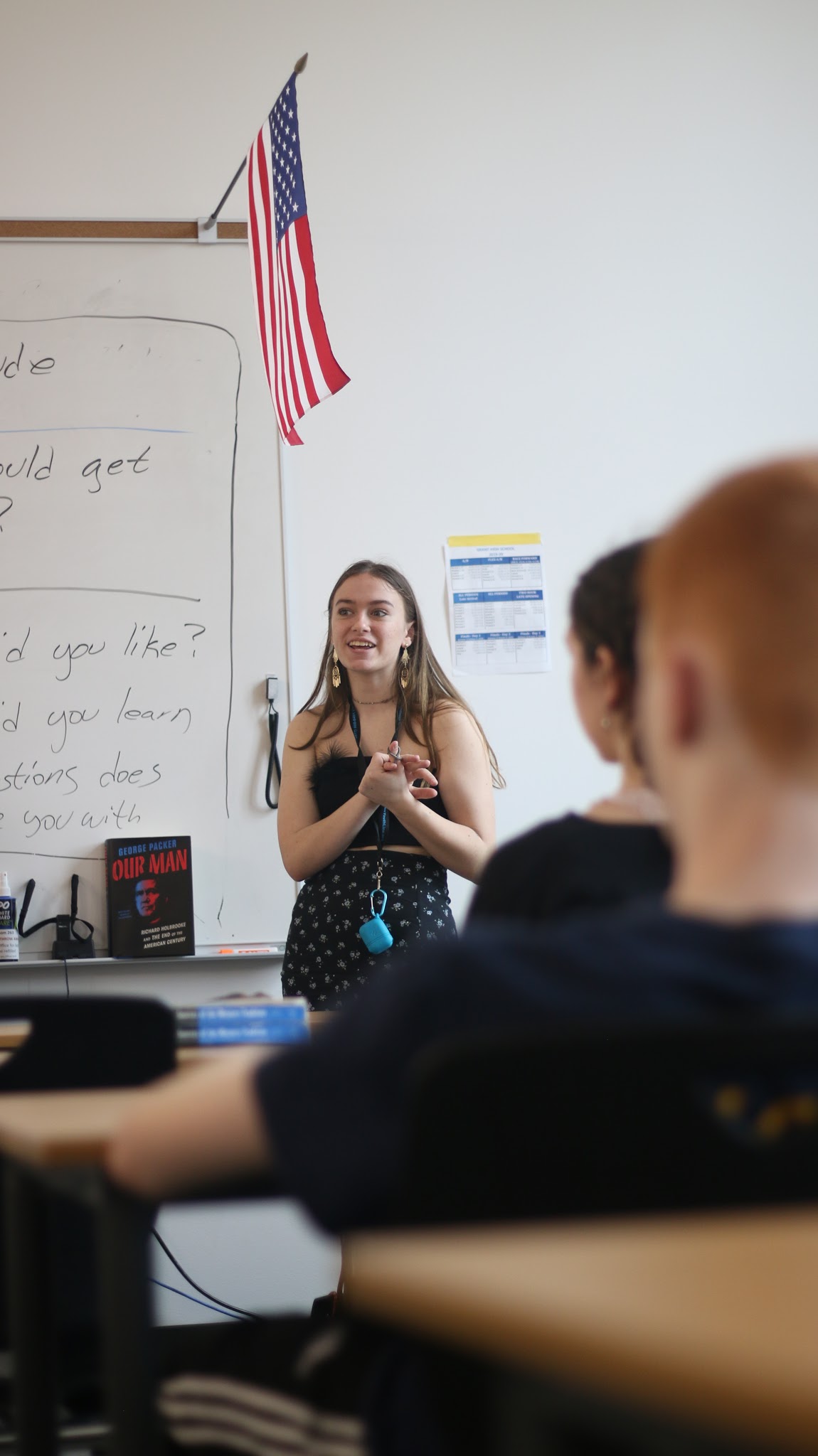
The buzzing of lights and grinding of pencil on paper are the only noises in Laurelhurst K-8’s creative writing class. As the rest of the class writes about fantasies, then eighth-grader Kate Punches tells a different story—one that is close to her heart. Punches’ story follows a boy in an inpatient hospital. The boy experiences psychotic episodes, where a girl follows the boy around, constantly harassing him, never leaving him alone. The boy, unaware of his psychosis, wants nothing more than for the girl to leave him be.
The boy spends more time at the hospital, and he soon realizes that the girl causing him so much pain and distress is not real but is instead a result of his psychosis. He checks out of the hospital, leaving behind all memory of the girl, and lives his life fully.
While writing the story, Punches realized that it was about her brother, Sam, who had come out as transgender during her fifth-grade year. The boy leaving the hospital without the girl represented Sam transitioning and living a better life under his true identity.
Before eighth grade, Punches had no way to deal with her trauma from Sam’s transition period; the class gave her a space to expurgate the trauma from her childhood.
Although she grew up in a difficult environment, Punches now uses those experiences to help others struggling with mental health issues. “One in four people have mental health issues, but four in four people have mental health. And it’s really not advocated as much as it should be,” says Punches.
Due to this lack of advocacy, Punches has become a source of support for her peers by starting her club, Mental Helpers. “We have … what, 20, 10 classes about physical health here at Grant? And we have none about mental health or mental health advocacy,” says Punches. “So I thought that would be something really beneficial [for students] to know that they have a support system here at Grant.”
Outside of school, Punches continues her work with mental health by volunteering her time at YouthLine, a nonprofit peer-to-peer helpline. “I started volunteering with smaller nonprofits and found it was really validating to me, and helped me find my self-worth,” says Punches. Advocating for others is Punches’ true calling—and her willingness to help people has been fundamental to her values since childhood.
Punches was very outgoing in her youth, striking up a conversation with nearly anyone she met. Equipped with a permanent smile, she was eager to make connections with people and learn about them.
Her outgoing personality translated into a leadership role, says Punches’ sister, Madeline. “She was always a champion for the underdog kind of people. And she would always look out for people who might fall victim to being picked on and whatnot.”
Of her four family members, Punches is closest with Madeline. Madeline says Punches was known to be funny and charismatic, and her personality turned everyday activities into fond memories. “My favorite memories of her are just when we’re both hanging out … running errands, even. Just normal activities, when we’re playing music and just being goofy … just having her as a sister and just having fun.”
Following the steps of her siblings, Punches enrolled in Richmond Elementary, a Japanese immersion school in Portland. She stayed there until her fourth-grade year when she transferred to Laurelhurst K-8. Punches was diagnosed with dyslexia; it was difficult for her to learn English, let alone an entirely new alphabet and language.
While Punches was settling into Laurelhurst, her brother, Sam, came out as transgender. His transition happened in 2013 when the acceptance of transgender people was relatively new. Still, Punches’ parents supported him throughout his transition.
While their support was vital to Sam’s mental health, it took a toll on Punches. “I definitely was an independent child in the way that I took care of myself for a long time so that my parents could take care of my brother,” says Punches.
It was during Sam’s transition when Punches was initially exposed to mental health issues. One of her first experiences was through Sam’s Instagram. It was a very popular account—with 20,000 followers—that talked about Sam’s struggles with mental health. When his followers discovered Punches was his sister, people would use Punches as a means of getting to him. Punches recalls a time when a fan of the account threatened to harm themself if they did not get in contact with Sam. Only 12 years old, Punches spoke to this fan and provided support for several months.
“She was always a champion for the underdog kind of people. And she would always look out for people who might fall victim to being picked on and whatnot.” – Madeline Punches
From the events during her brother’s transition period, the relationship with her parents is on rocky terms. In Punches’ view, they play a minor role in her life; she attends doctor’s appointments and other important meetings alone. But to Punches, this is natural. She grew estranged from her parents at such a young age, so for her, a relationship with either of them would be unusual. “It’s not something I feel I need to have in my life,” she says. “I have other great support systems in my life.” While it was difficult for her to grow up independently, it helped Sam have a better time during his transition. And to Punches, that is what matters the most.
Freshman year was the first time Punches received help for her mental health issues. She was enrolled in Grant’s joint P.E. and health class, Fit2Live&Learn. During the class’s mental health unit, Grant counselors came and gave students a survey, asking students about the state of their mental health and whether or not they wanted to receive support.
Because Punches never had anyone to talk to about her trauma, she was reluctant to accept the support the survey offered. But Punches took a leap of faith and took advantage of the opportunity; she began meeting with a school psychiatrist biweekly. While the meetings were beneficial in that she had someone to talk to, Punches was never comfortable enough to see meaningful growth from their sessions. “I wasn’t willing to share information with her, so she wasn’t able to help me as much as she could have,” says Punches. She continued to meet with this psychiatrist until her sophomore year. Though she was getting support, it was not the support she needed.
Only months after beginning her sophomore year, in January of 2019, Punches reached one of the lowest points of her life. Punches had already been struggling with depression at the time, and when a valued relationship ended, she was dragged further down. Her pain was not from the loss of the specific person, but more the sudden absence of major support. Punches was alone—again.
One of the people Punches went to was Grant counselor Megan Schlicker. At first, she was hesitant; she believed that the counseling system harmed students rather than helping them. “I used to think (Emergency Services) and (Child Protective Services) and mandatory reporting was the most terrifying stuff in the world … when you’re in that mindset of having a lot of mental struggles, you’re kind of in a fixed mindset of ‘nothing is going to help me right now, I am in this alone.’”
Punches was also wary to reach out to the counseling system for fear of her parents’ reaction. With years of division, the thought of her parents being involved with something so vulnerable was anxiety-inducing for Punches.
But when Punches did reach out to Schlicker, the opposite happened. “I was definitely someone who (believed the stigma) for a long time until I was at a breaking point and told Megan, thinking my world was going to be over. But nothing changed in my life except for I had other support systems.” Punches’ experience in the counseling system remained completely confidential and allowed her to heal on her own terms.
Schlicker connected Punches with a psychiatrist and a therapist. She was diagnosed with an anxiety disorder and depression, as well as Post Traumatic Stress Disorder (PTSD). “I felt like I was affected by stuff that happened in the past, but to be able to identify it and work on it weekly was a really crazy improvement for myself,” says Punches. She was exposed to the reality of the Grant counseling system and learned how justified it is.
In the spring of 2019, Punches learned about YouthLine from Emma Cooper, a fellow Grant student. Punches met Cooper at a trauma group, where they worked on living beyond their distressing pasts. Cooper had been heavily involved in advocacy work at the time and quickly became a role model of Punches,’
“I was kind of in a place where I felt like my trauma defined me. And seeing Emma be able to grow from her trauma and … advocate for people and support people … she is the reason I joined YouthLine. She’s the reason I’m such a big advocate for mental health,” says Punches. With someone like Cooper to look up to, Punches immediately wanted to follow in her footsteps. After joining in early 2019, Punches fell in love with her work and has since amassed over 300 volunteer hours with the YouthLine.
The most rewarding part of YouthLine for Punches is calming a person in distress. “If the conversation starts off with them saying, ‘I don’t know if I can stay safe right now,’ and then it ends with, ‘Yeah, I can stay safe tonight’ … getting from that point to that point (is) also really validating,” says Punches. To Punches, progress is not linear; YouthLine emphasizes the weight of all progress, big and small. Punches makes sure to tell the contact that by just reaching out to the organization, they are already making strides toward bettering themselves.
Punches says the tools gained from the extensive YouthLine training influence her daily life. YouthLine workers learn to stay composed and collected, even through the most stressful situations. While there is always a professional supervising the lines, Punches says that the importance of the way the interaction is handled in the moment cannot be understated.
When navigating those delicate situations, Punches says that recognizing the context is vital; should she misspeak, she could do more harm than good to the person in crisis. “Maybe they had a really bad experience, and they have trauma … I think it’s a discussion that needs to be more normalized, of trying to hold space and compassion for people’s opinions if they differ from yours.”
Since joining YouthLine, Punches has learned how to better support her friends. “Even before I was super close with Punches, I always felt comfortable telling her stuff because she just knows what to do. She’s literally trained for it,” says Punches’s close friend, Laney Darden. “I feel like since I’ve been so comfortable around her with my own problems, it just brings me to be really close with her.”
In the fall of 2019, armed with the training and knowledge from YouthLine, Punches created the Mental Helpers Club. The weekly meetings focus on different facets of mental health, and the club teaches how to better support people struggling with mental health issues.
One thing that is stressed at Mental Helpers Club is the role of mandatory reporting and the school counseling system. “(With) the counseling system, everyone there is to support you and work with you on how you can get the best support. So it’s really put in this negative light when so often it’s really just to support struggling people,” says Punches. Mental Helpers works to undo the stigma that prevented Punches from getting help in hopes of enabling others in similar situations to get the support they deserve.

Punches is also working to expand the education of the Mental Helpers Club to more than the student body. In late February, Punches attended a mental health youth forum held by Multnomah County. She, alongside students from other Oregon schools, discussed with school administrators and medical professionals ways to improve mental health support. When Punches returned from the forum, she met with Grant Vice Principal, Liz Mahlum, to continue the conversations. Together, they are working to educate staff on basic support training, implement other methods for students to reach out to support staff and make current resources more accessible to students.
In doing this, Punches is setting out to change the stigma surrounding mental health support. Before receiving help, she believed that had she shared her struggles, the response would have been, “‘you are going to a facility. You can’t be safe, you need to be locked away, type of (expletive),’” says Punches. Now she strives to change that belief. “I think there are a lot of systemic issues that can be prevented by talking about mental health: learning how to take care of yourself, supporting others in the community, how to ask about suicide or who you can get support from.”
Resources:
- YouthLine: text TEEN2TEEN to 839863 or call at 877-968-8491
- Trevor Project: call at 1-866-488-7386
- National Suicide Prevention Line: 1-800-273-8255
- NAMI: Gives more specific resources for certain disparities
- National Eating Disorders Center Helpline: 800-931-237
- Planned Parenthood: 800-230-PLAN (7526)




